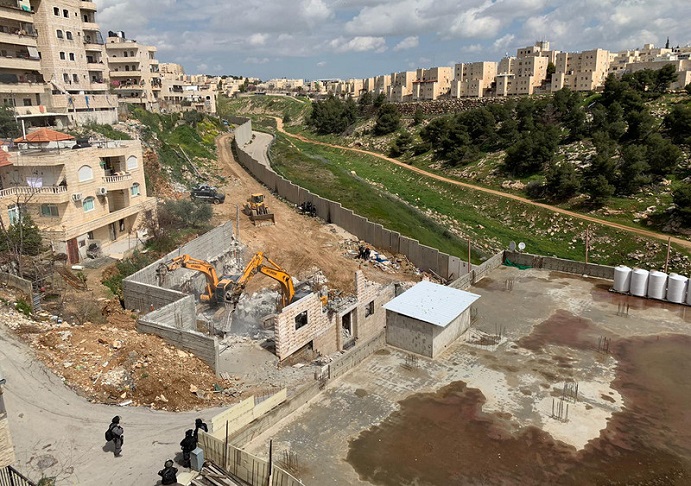
The Electronic Intifada / May 11, 2019
Israeli occupation forces have sharply escalated their demolitions of Palestinian properties in East Jerusalem.
As a result, more Palestinians have been made homeless this year than in all of 2018.
United Nations humanitarian coordinator Jamie McGoldrick decried the alarming trend, calling on Israel to immediately halt all destruction of Palestinian property.
“Demolitions in East Jerusalem have increased at a staggering pace over the last month, leaving tens of Palestinians displaced and others who have lost their livelihoods overnight,” McGoldrick said last week.
“This must stop.”
Israel demolished more than 100 Palestinian structures in East Jerusalem since the beginning of the year – about half of all demolitions in the occupied West Bank as of the end of April.
“More Palestinians were displaced in East Jerusalem in the first four months of 2019 than in all of 2018, 193 compared to 176,” the UN stated.
Dark month
On just one day – 29 April – Israeli occupation forces destroyed 31 structures in multiple neighborhoods in East Jerusalem.
This was the highest number of demolitions on a single day since UN monitoring group OCHA began keeping records in 2009.
The next day, Israeli forces carried out four more demolitions in the Wadi Yasul area in the Silwan neighborhood, leaving 11 Palestinian refugees homeless, including seven children.
Silwan is the focus of intense government-backed settlement activity by Jewish extremist groups.
Israeli settlement in the occupied West Bank, including East Jerusalem, is a war crime.
Israeli occupation forces attacked residents during the demolition, seriously injuring five:
Israeli forces used “beatings, stun grenades and sponge-covered bullets as residents tried to retrieve belongings prior to the demolitions,” according to the UN.
The house of Anas Burqan was among those demolished that day.
This picture shows Israeli forces surrounding his home prior to destroying it:
Israeli forces injured Burqan with a sponge-tipped bullet, and then severely beat and arrested him.
Sponge or foam-tipped rounds sound harmless, but are intended to cause extreme pain. They can cause serious injury or death.
Burqan was released on bail days later to house arrest and banned for several more days from the Wadi Yasul neighborhood.
“Nearly all structures in Wadi Yasul face a heightened risk of demolition following the near complete exhaustion of efforts to protect homes in the area,” the UN said.
“Over 550 people face the threat of displacement as a result, around a quarter of whom are registered Palestine refugees.”
Some elderly residents of Wadi Yasul were forcibly displaced from their homes in other areas of historic Palestine during the Nakba – the 1948 ethnic cleansing of Palestinians carried out by Zionist forces to establish the state of Israel in their place.
War on Wadi Yasul
Last month, Israel’s high court approved the expulsion of 500 families in Wadi Yasul.
The court rejected an appeal by three of the families to halt the demolition of some 60 homes built without permits, which Israel almost never grants to Palestinians, leaving them no choice but to build homes without permission.
Palestinian landowners built the neighborhood some 30 years ago without Israeli permits, but on their own land. Israel had classified the land as “green areas,” a pretext for banning Palestinians from building on their own property.
One judge, Miriam Lomp, said “she was aware the decision would affect the fates of hundreds of families,” according to Israeli daily Haaretz.
The mass demolitions began almost immediately.
Last November, Israel’s high court gave the green light to evict 700 Palestinian residents of Silwan from the homes they have lived in for decades.
Given the international impunity Israel enjoys, this means that the frenzy of destruction in Jerusalem is unlikely to slow any time soon.
Tamara Nassar is an assistant editor at The Electronic Intifada












